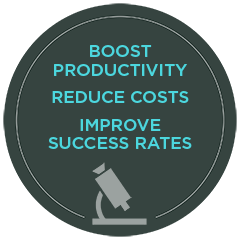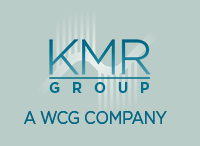
Trusted Data Source
From our annual flagship R&D General Metrics Study conducted on behalf of the Pharmaceutical Benchmarking Forum, to more focused analysis on Discovery, Biologics or Project Cost, providing peerless data on current R&D performance is a core part of our business.
Top biopharmaceutical companies rely on KMR data because for high impact decisions, the need for vetted, quality, and trustworthy data is crucial.
KMR Group data is trusted source data. It is provided directly via sponsor companies and KMR performs hundreds of checks and cross checks on this information to ensure its integrity.
Below are just a few critical R&D performance indicators available through KMR.
Ethical Pharmaceutical R&D Spending across top companies – most publicly availably R&D spending includes more than just spending on ethical pharmaceuticals making it impossible to benchmark spending and even more relevant, productivity across companies that relies on investment in R&D. KMR works directly with each company in its dataset to generate comparable ethical R&D spending figures across companies.
Comparable R&D Productivity Measures – from inputs such as R&D spending to outputs such as NME approvals, KMR is the premier source for comparable R&D productivity measures across top biopharmaceutical companies. KMR uses only spending on ethical pharmaceutical R&D as part of its calculations and global NME entries and approvals in major markets (not just FDA NME approvals) so that the inputs and outputs are consistent across companies.
NME Success Rates – KMR-calculated success rates are the best in the industry because each company that contributes data to KMR’s dataset is treated consistently and the methods employed for calculating these rates conform to standardized and rigorous processes. Given that small differences in success rates can have a huge impact on planning scenarios, for example, a 1% difference in overall success rates can result in 10 more NME entries needed in Preclinical to get 1 NME approval, it is important to have a reliable and trusted source for this information.
NME Cycle Times – What does it meant to say cycle times are increasing or decreasing for the Industry, for your company? The only way to answer that question is to use standardized data using reliable and consistent methods, both of which KMR offers.
Discovery is often underserved when it comes to benchmarking data. Key performance measures such as Target Success Rates, Target Cycle Times, Early Development Self-originated Success Rates and Discovery Productivity are all critical to measuring the performance of Discovery.
Project Cost Data – A key component of any R&D Productivity measure is generally associated with cost. As such, it is fundamental to understand how much it costs to pursue any given drug development project whether it be internally, with a co-development partner or as part of a licensing or acquisition deal. KMR has worked with companies to devise a reliable, robust, and systemic way to extract the cost incurred for each project in your portfolio using a top-down approach making the final figures appropriate and comparable for benchmarking, forecasting, and planning or to calculate the full cost of drug development.
Explore KMR Group’s R&D performance data products and services, including options for custom analytics and consulting services.
Applications
- R&D Metrix: Development Metrix
- R&D Metrix: Discovery Metrix
- Project Cost Metrix
Studies
- Vaccines R&D Benchmarking Study
- R&D General Metrics Study
- Vaccines R&D Study
- Project Cost Study
- Oncology R&D Study
- Discovery Performance Study
Reports
- R&D Advantage – Key Productivity Metrics for R&D

